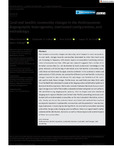Coral reef benthic community changes in the Anthropocene: Biogeographic heterogeneity, overlooked configurations, and methodology
| dc.contributor.author | Reverter, Miriam | |
| dc.contributor.author | Helber, SB | |
| dc.contributor.author | Rohde, S | |
| dc.contributor.author | Goeij, JM | |
| dc.contributor.author | Schupp, PJ | |
| dc.date.accessioned | 2022-03-10T16:37:37Z | |
| dc.date.issued | 2022-03 | |
| dc.identifier.issn | 1354-1013 | |
| dc.identifier.issn | 1365-2486 | |
| dc.identifier.uri | http://hdl.handle.net/10026.1/18931 | |
| dc.description.abstract |
Non-random community changes are becoming more frequent in many ecosystems. In coral reefs, changes towards communities dominated by other than hard corals are increasing in frequency, with severe impacts on ecosystem functioning and provision of ecosystem services. Although new research suggests that a variety of alternative communities (i.e. not dominated by hard corals) exist, knowledge on the global diversity and functioning of alternative coral reef benthic communities, especially those not dominated by algae, remains scattered. In this systematic review and meta-analysis of 523 articles, we analyse the different coral reef benthic community changes reported to date and discuss the advantages and limitations of the methods used to study these changes. Furthermore, we used field cover data (1116 reefs from the ReefCheck database) to explore the biogeographic and latitudinal patterns in dominant benthic organisms. We found a mismatch between literature focus on coral-algal changes (over half of the studies analysed) and observed global natural patterns. We identified strong biogeographic patterns, with the largest and most biodiverse biogeographic regions (Western and Central Indo-Pacific) presenting previously overlooked soft-coral-dominated communities as the most abundant alternative community. Finally, we discuss the potential biases associated with methods that overlook ecologically important cryptobenthic communities and the potential of new technological advances in improving monitoring efforts. As coral reef communities inevitably and swiftly change under changing ocean conditions, there is an urgent need to better understand the distribution, dynamics as well as the ecological and societal impacts of these new communities. | |
| dc.format.extent | 1956-1971 | |
| dc.format.medium | Print-Electronic | |
| dc.language | en | |
| dc.language.iso | eng | |
| dc.publisher | Wiley | |
| dc.subject | Anthropocene | |
| dc.subject | benthic organisms | |
| dc.subject | community turnover | |
| dc.subject | coral reefs | |
| dc.subject | reef changes | |
| dc.subject | reef monitoring | |
| dc.title | Coral reef benthic community changes in the Anthropocene: Biogeographic heterogeneity, overlooked configurations, and methodology | |
| dc.type | journal-article | |
| dc.type | Journal Article | |
| dc.type | Meta-Analysis | |
| dc.type | Review | |
| dc.type | Systematic Review | |
| plymouth.author-url | https://www.webofscience.com/api/gateway?GWVersion=2&SrcApp=PARTNER_APP&SrcAuth=LinksAMR&KeyUT=WOS:000734112400001&DestLinkType=FullRecord&DestApp=ALL_WOS&UsrCustomerID=11bb513d99f797142bcfeffcc58ea008 | |
| plymouth.issue | 6 | |
| plymouth.volume | 28 | |
| plymouth.publication-status | Published | |
| plymouth.journal | Global Change Biology | |
| dc.identifier.doi | 10.1111/gcb.16034 | |
| plymouth.organisational-group | /Plymouth | |
| plymouth.organisational-group | /Plymouth/Faculty of Science and Engineering | |
| plymouth.organisational-group | /Plymouth/Faculty of Science and Engineering/School of Biological and Marine Sciences | |
| plymouth.organisational-group | /Plymouth/Users by role | |
| plymouth.organisational-group | /Plymouth/Users by role/Academics | |
| dc.publisher.place | England | |
| dcterms.dateAccepted | 2021-12-07 | |
| dc.rights.embargodate | 2023-8-16 | |
| dc.identifier.eissn | 1365-2486 | |
| dc.rights.embargoperiod | Not known | |
| rioxxterms.versionofrecord | 10.1111/gcb.16034 | |
| rioxxterms.licenseref.uri | http://www.rioxx.net/licenses/all-rights-reserved | |
| rioxxterms.licenseref.startdate | 2022-03 | |
| rioxxterms.type | Journal Article/Review |


